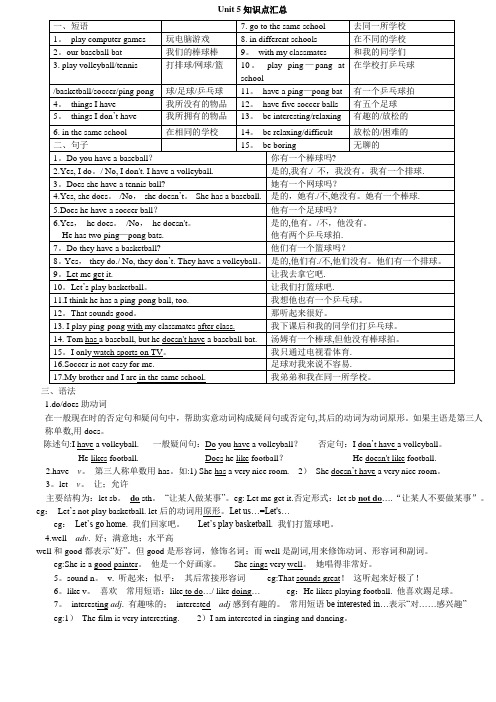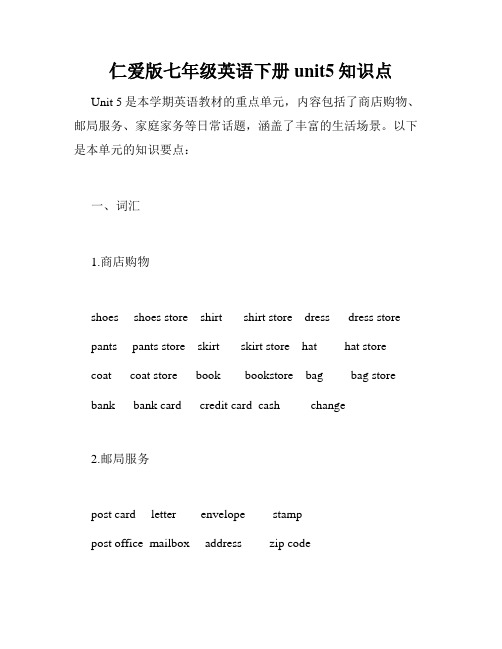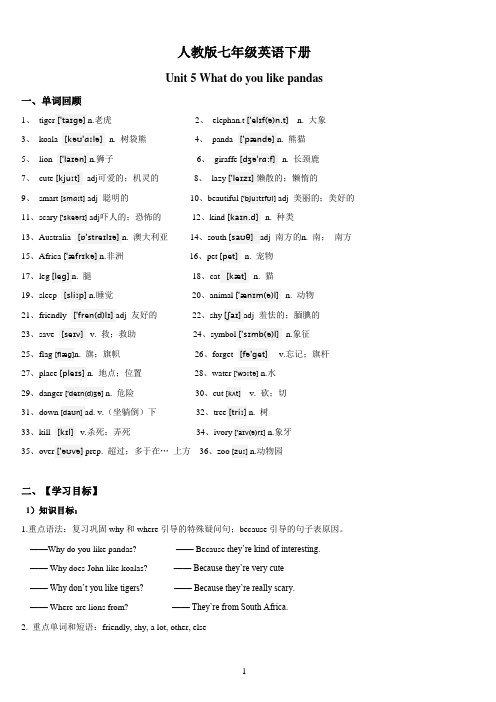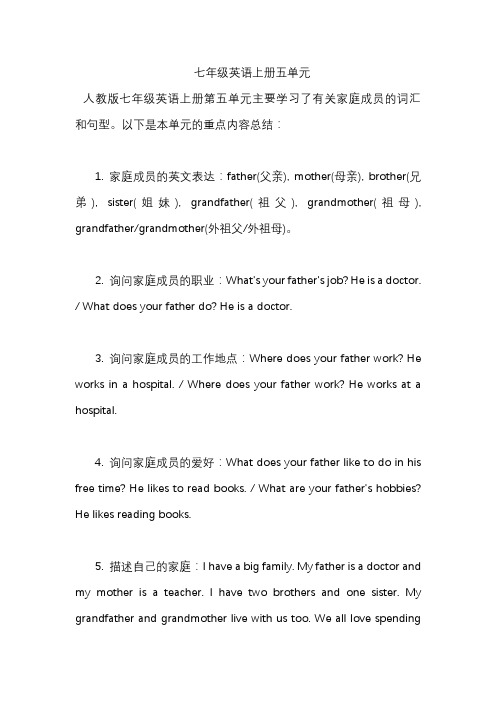七年级英语Unit5
人教版七年级英语上册 unit 5 句式讲解及知识梳理

人教版七年级英语上册unit 5 句式讲解及知识梳理01Unit5 单词do /du:/在哪里;到哪里have /hæv/ 有tennis /'tenɪs/网球ball /bɔ:l/球ping-pong 乒乓球bat /bæt/球棒;球拍soccer /'sɑ:kər/,/'sɒkə/(英式)足球soccer ball(英式)足球volleyball /'vɒlɪbɔ:l/排球basketball /'bɑ:skɪtbɔ:l/篮球hey /heɪ/嘿;喂let /let/允许;让us /ʌs/ (we 的宾格)我们let's = let us 让我们(一起)go /ɡəʊ/去;走we /wi:/我们late /leɪt/迟到has /hæz/有(have 的第三人称单数形式)get /ɡet/去取(或带来);得到great /ɡreɪt/美妙的;伟大的play /pleɪ/参加(比赛或运动);玩耍sound /saʊnd/听起来好像interesting /'ɪntrəstɪŋ/有趣的;使人快乐的;乐趣;快乐difficult /'dɪfɪkəlt/苦难的relaxing /rɪ'læksɪŋ/轻松的;令人放松的watch /wɒʧ/注视;观看TV /,ti:'vi:/看电视same /seɪm/相同的love /lʌv/爱;喜爱with /wɪð/ 和...在一起;带有;使用sport /spɔ:(r)t/体育运动them /ðem/ /ð əm/他(她、它)们only /'əʊnlɪ/只;仅like /laɪk/喜欢;喜爱easy /'i:zi/容易的;不费力的after /'ɑ:ftə/在...之后class /klɑ:s/班级;课classmate/'klɑ:smeɪt/同班同学02Unit5 知识梳理Unit5 Do you have a soccer ball?【重点短语】1.have a volleyball 有一个排球2.play volleyball/tennis 打排球/网球3.have a ping-pong/table tennis 有一个乒乓球4.play ping-pong/table tennis 打乒乓球5.with our friends 和我们的朋友一起6.have a football/soccer ball 有一个足球7.play football/soccer 踢足球8.at school 在校,在上学9.play sports 做运动10.play computer games 玩电脑游戏11.watch TV 看电视12.in the same school 在同一所学校13.after class 下课后14.go to school 去上学【重点句型】1.—Do you have a ping-pong bat? 你有一个乒乓球拍吗?—No, I don’t. 不,我没有。
七年级上册英语unit5笔记

七年级上册英语unit5笔记Unit 5: My School DayIn Unit 5, we will focus on talking about our daily routines and activities at school. We will learn how to describe our school day, including subjects, teachers, and extracurricular activities. This unit will help us improve our vocabulary and grammar skills, as well as develop our speaking and listening abilities in English.1. School Subjects:In this unit, we will learn how to talk about different school subjects in English. We will practice asking and answering questions about our favorite subjects, using expressions like "What's your favorite subject?" and "I like (subject) because...". We will also learn the names of common school subjects, such as English, Math, Science, History, and Geography.2. Daily Routines:We will also learn how to describe our daily routines at school. We will practice using time expressions and action verbs to talk about our daily activities, such as "I wake up at 7 o'clock" or "I have breakfast at 8 o'clock". We will also learn how to use adverbs of frequency, such as always, usually, sometimes, and never, to describe how often we do certain activities.3. Describing Teachers:In this unit, we will learn how to describe our teachers. We will practice using adjectives to talk about their appearance, personality, and teaching style. We will also learn how to ask and answer questions about our teachers, using expressions like "What does your English teacher look like?" and "Is your Science teacher strict or lenient?"4. Extracurricular Activities:We will also learn about extracurricular activities at school. We will learn how to talk about our hobbies, interests, and clubs we join. We will practice using verbs like play, do, and join, and expressions like "I play soccer after school" or "I do art club on Wednesdays". We will also learn how to ask and answer questions about extracurricular activities, such as "What sports do you play?" and "Which club do you join?"5. Giving Opinions:In this unit, we will learn how to express our opinions about school subjects and activities. We will practice using adjectives and adverbs to describe our preferences and opinions, such as "I think Math is difficult" or "I really enjoy playing basketball". Wewill also learn how to ask for opinions, using expressions like "What do you think about Science?" and "Do you like doing homework?"Overall, Unit 5 will help us develop our English language skills by focusing on daily routines, school subjects, describing teachers, extracurricular activities, and expressing opinions. By the end of this unit, we will be able to confidently talk about our school day and engage in conversations about school-related topics. Let's get ready to improve our English skills and have fun in Unit 5!。
人教版七年级上册英语Unit5Doyouhaveasoccerball复习课件共20张PPT

Let’s play soccer. 咱们踢球吧。 ★本句是以let开头的祈使句,结构为
“Let’s do sth.”,意为“咱们…… 吧”,常用于提出建议。句中的动词 用原形。如:
Let’s play basketball. 咱们打篮球吧。
That sounds good. 句中的sound 为系动词,其后接形
A. has;have B. have;have
C. have;has D. has; has
3. — Do you have a baseball? — _B__, I ___. A. Yes; don’t B. No; don’t C. Yes; doesn’t D. No; does
4. — _B__Peter ___a volleyball? — Yes, he does. A. Do; have B. Does; have C. Do; has D. Does; has
重点句型
1. --- Do you/ they have…? 你/他们有…?
--- Yes, I/they do. 是的,我/他们有。
或--- No, I /they don’t. 不,我/他们没有。
2. --- Does he/she have…? 他/她有…..? --- Yes, he/she does. 是的, 他/她有。
beautiful hat.
4. — _D__o___you _h__a_v_e__(有) a pen?
—Yes, I __d_o_____. 5. —_D__o_e_s __he__h_a_v_e__(有) a volleyball? —No, he_d_o_e_s_n_’_t .
“谈论物主关系、提出建议”是本单元的 语
人教版七年级英语上册Unit5短语、句型、知识点总结

Unit 5知识点汇总三、语法1.do/does助动词在一般现在时的否定句和疑问句中,帮助实意动词构成疑问句或否定句,其后的动词为动词原形。
如果主语是第三人称单数,用does。
陈述句:I have a volleyball. 一般疑问句:Do you have a volleyball?否定句:I don’t have a volleyball。
He likes football. Does he like football?He doesn't like football.2.have v。
第三人称单数用has。
如:1) She has a very nice room. 2)She doesn’t have a very nice room。
3。
let v。
让;允许主要结构为:let sb。
do sth。
“让某人做某事”。
eg: Let me get it.否定形式:let sb not do….“让某人不要做某事”。
eg:Let’s not play basketball. let后的动词用原形。
Let us…=Let's…eg:Let’s go home. 我们回家吧。
Let’s play basketball. 我们打篮球吧。
4.well adv. 好;满意地;水平高well和good都表示“好”。
但good是形容词,修饰名词;而well是副词,用来修饰动词、形容词和副词。
eg:She is a good painter。
他是一个好画家。
She sings very well。
她唱得非常好。
5。
sound n。
v. 听起来;似乎:其后常接形容词eg:That sounds great!这听起来好极了!6。
like v。
喜欢常用短语:like to do…/ like doing…eg:He likes playing football. 他喜欢踢足球。
7。
interesting adj. 有趣味的;interested adj感到有趣的。
仁爱版七年级英语下册unit5知识点

仁爱版七年级英语下册unit5知识点Unit 5是本学期英语教材的重点单元,内容包括了商店购物、邮局服务、家庭家务等日常话题,涵盖了丰富的生活场景。
以下是本单元的知识要点:一、词汇1.商店购物shoes shoes store shirt shirt store dress dress storepants pants store skirt skirt store hat hat storecoat coat store book bookstore bag bag storebank bank card credit card cash change2.邮局服务post card letter envelope stamppost office mailbox address zip code3.家庭家务clean clean up sweep mopwash laundry fold drydish do the dishes set the table clear the table二、重点语法本单元的语法重点是一般现在时和there be句型的运用。
1.一般现在时一般现在时通常用来表示反复发生的动作、习惯性的行为或者现在的状态。
它的构成方式是主语+动词原形+其他。
注意第三人称单数形式应该在动词后面加上“s”。
例如:I often go shopping on weekends. (我经常在周末去购物。
)She always buys books in the bookstore. (她总是在书店买书。
)2.there be句型there be句型用来表示某地或某处有某物。
当表示单数或者不可数名词时,应该用there is;当表示复数名词时,应该用there are。
例如:There is a bank in front of the bookstore. (书店前面有一家银行。
)There are some chairs in the classroom. (教室里有一些椅子。
七年级上册英语unit 5单词表

七年级上册英语Unit 5单词表1. ambition [æmˈbɪʃ(ə)n] n. 雄心,抱负2. behavior [bɪˈheɪvjə(r)] n. 行为,举止3. charity [ˈtʃærɪtɪ] n. 慈善,慈善团体4. courage [ˈkʌrɪdʒ] n. 勇气,胆量5. deceive [dɪˈsiːv] v. 欺骗,蒙骗6. evil [ˈiːvl] adj. 邪恶的,恶毒的7. f本人thful [ˈfeɪθf(ə)l] adj. 忠实的,忠诚的8. grateful [ˈɡreɪtf(ə)l] adj. 感激的,感恩的9. hesitate [ˈhezɪteɪt] v. 犹豫,踌躇10. inspire [ɪnˈspaɪə(r)] v. 鼓舞,激励……50. verbal [ˈvɜːb(ə)l] adj. 口头的,用言辞的51. wedding [ˈweddɪŋ] n. 婚礼,结婚以上是七年级上册英语Unit 5的单词表,其中包含了50个常用单词。
这些单词是学生在学习英语时需要掌握和运用的基础词汇,它们涵盖了各个方面的生活场景和话题,包括情感、社交、家庭、学校等。
掌握这些单词不仅有助于学生在日常生活中进行交流,也为他们在学习和考试中取得更好的成绩提供了基础。
在学习这些单词的过程中,学生可以通过多种方式进行记忆和运用。
可以通过制作抽认卡、组织单词比赛、编写句子等方式来巩固单词的理解和记忆。
老师还可以结合课堂教学和课外阅读,让学生在不同的场景和语境中接触和运用这些单词,以提高他们的语言综合能力。
需要注意的是,单词的掌握并非是一劳永逸的事情,学生应该在日常学习中不断地复习和巩固已学的单词,同时也要不断地接触新的单词,拓展自己的词汇量。
只有在不断地积累和运用中,学生才能真正掌握英语单词,提高自己的语言能力。
七年级上册英语Unit 5单词表是学生学习英语时的重要工具,通过多种方式的学习和运用,学生可以更好地掌握这些单词,提高自己的语言能力。
人教版七年级英语下册unit5(详细内容)

人教版七年级英语下册Unit 5 What do you like pandas一、单词回顾1、tiger['taɪgə] n.老虎2、elephan.t['elɪf(ə)n.t]n. 大象3、koala [kəʊ'ɑːlə]n. 树袋熊4、panda ['pændə] n. 熊猫5、lion ['laɪən] n.狮子6、giraffe [dʒə'rɑ:f]n. 长颈鹿7、cute [kjuːt]adj可爱的;机灵的8、lazy ['leɪzɪ]懒散的;懒惰的9、smart [smɑːt] adj 聪明的10、beautiful ['bjuːtɪfʊl] adj 美丽的;美好的11、scary ['skeərɪ] adj吓人的;恐怖的12、kind [kaɪn.d]n. 种类13、Australia [ɒ'streɪlɪə] n. 澳大利亚14、south [saʊθ]adj 南方的n. 南;南方15、Africa ['æfrɪkə]n.非洲16、pet [pet]n. 宠物17、leg [leg]n. 腿18、cat[kæt]n. 猫19、sleep [sliːp]n.睡觉20、animal ['ænɪm(ə)l]n. 动物21、friendly ['fren(d)lɪ]adj 友好的22、shy [ʃaɪ]adj 羞怯的;腼腆的23、save [seɪv]v. 救;救助24、symbol['sɪmb(ə)l]n.象征25、flag [flæg]n. 旗;旗帜26、forget [fə'get]v.忘记;旗杆27、place [pleɪs]n. 地点;位置28、water ['wɔːtə] n.水29、danger ['deɪn(d)ʒə] n. 危险30、cut [kʌt]v. 砍;切31、down [daʊn] ad. v.(坐躺倒)下32、tree[triː] n. 树33、kill [kɪl]v.杀死;弄死34、ivory ['aɪv(ə)rɪ] n.象牙35、over['əʊvə] prep. 超过;多于在…上方36、zoo [zuː] n.动物园二、【学习目标】1)知识目标:1.重点语法:复习巩固why和where引导的特殊疑问句;because引导的句子表原因。
七年级英语上册五单元

七年级英语上册五单元
人教版七年级英语上册第五单元主要学习了有关家庭成员的词汇和句型。
以下是本单元的重点内容总结:
1. 家庭成员的英文表达:father(父亲), mother(母亲), brother(兄弟), sister(姐妹), grandfather(祖父), grandmother(祖母), grandfather/grandmother(外祖父/外祖母)。
2. 询问家庭成员的职业:What's your father's job? He is a doctor. / What does your father do? He is a doctor.
3. 询问家庭成员的工作地点:Where does your father work? He works in a hospital. / Where does your father work? He works at a hospital.
4. 询问家庭成员的爱好:What does your father like to do in his free time? He likes to read books. / What are your father's hobbies? He likes reading books.
5. 描述自己的家庭:I have a big family. My father is a doctor and my mother is a teacher. I have two brothers and one sister. My grandfather and grandmother live with us too. We all love spending
time together.。
- 1、下载文档前请自行甄别文档内容的完整性,平台不提供额外的编辑、内容补充、找答案等附加服务。
- 2、"仅部分预览"的文档,不可在线预览部分如存在完整性等问题,可反馈申请退款(可完整预览的文档不适用该条件!)。
- 3、如文档侵犯您的权益,请联系客服反馈,我们会尽快为您处理(人工客服工作时间:9:00-18:30)。
七年级英语Unit5 –7测试题第Ⅰ卷(选择题,共75分)二、单项填空(15分)从每题A.B.C.D中选出一个能填入句中空白处的最佳答案。
( )21. -- What's this ?-- It's ___ orange, ____ orange is _____ orange .A. an, an, theB. an, the, / C the, the, the D. an, an, /( )22. What a fine day! Let’s play ___ basketball.A. theB. aC. /D. an( )23. Tom doesn’t __ a tennis racket, but his sister___ one.A. has ; haveB. have; haveC. have; hasD. has; has( )24. --Does he like playing basketball? -- ________A. Yes, he does.B. No, he does.C. Yes, he doesn’t.D. No, he can’t.( )25. I like sports _________ I don’t play sports every day.A. butB. andC. orD. only( )26. Miss Yang teaches _____ English.A. usB. ourC. weD. ours( )27. -- _____? -- Yes, some ice cream, please.A. How are youB. Can I help youC. What can you do for meD. What do you want( )28. --______ is the red sweater ? --It's 50 Yuan .A. WhatB. How muchC. WhereD. How( )29. -- _____ your sister and brother like bananas? -- _________.A. Do; Yes, she does.B. Do; No, they don’t.C. Does; Yes, she does.D. Do; Yes, they are.( )30. They have T-shirts _______ green and black for only $13_______ the shop.A. at; atB. in; inC. with; withD. at; in( )31. -- _____ your sister and brother like bananas? -- _________.A. Do; Yes, she does.B. Do; No, they don’t.C. Does; Yes, she does.D. Do; Yes, they are.( )32. -- do you like for breakfast? --Two eggs and some milk.A. WhereB. HowC. WhatD. What’s( )33. They can buy the pens ____ a very good ______ .A. at; priceB. in; priceC. at; costD. at selling( )34. --The T-shirt is only ten dollars. --I’ll ________it.A. buyB. takeC. saleD. sell( )35. --How much are the pants? --________ twenty dollars.A. It hasB. It isC. They haveD. They are三、完形填空(10分)Near our school there is a store. It’s____36____ but there’re ___37____of school things. Do___38____ like exercise books, erasers, pens ____39_____ color pencils? They’re____40____ Big erasers are just one yuan____41_____ and the small one is 0.5yuan. The color pencils are just ____42___ 2 yuan. I want the cartoon pencil sharpener. It is ____43_____ expensive, either. I will take____44____. Do you want some school things for yourself? Just come ___45______ this store.( )36. A. big B. small C. long( )37. A. lots B. lot C. many( )38. A.I B. they C. you( )39. A. or B. and C. but( )40. A. expensive B. cheap C. dear( )41. A. one B. every C. each( )42. A. for B. on C. in( )43. A. not B. no C. /( )44. A. them B. it C. that( )45 . A. for B. to C. down四、阅读理解(30分)AMrs. Black and her daughter Jane are in a store.Clerk: What can I do for you?Mrs. Black: I want a sweater for my daughter.Clerk: What color does she like?Mrs. Black(to Jane): What color do you like, dear?Jane: I like yellow.Clerk: Do you like this one?Jane: Yes, it’s really beautiful. How much is it?Clerk: 80 dollars.Mrs. Black: It’s too expensive(昂贵的).Clerk: Look at this blue one. It’s only 30 dollars.Mrs. Black: Mmm. I think the blue one is nice, too.Jane: But, Mom, I don’t like blue.Mrs. Black: OK, we’ll take the yellow one.Jane: Thank you, Mom.Clerk: Here you are.Mrs. Black: Thanks.Clerk: You are welcome.( )46. Where is Mrs. Black?A. At home.B. At school.C. In a clothes store.D. In her bedroom. ( )47. What color does Jane like?A. White.B. Yellow.C. Blue.D. Black.( )48. How much is the blue sweater?A. 80 dollars.B. 50 dollars.C. 30 dollars.D. 20 dollars.( )49.Which sweater(s) do they buy?A. The yellow one.B. The blue one.C. The blue one and the yellow one.D. They don’t buy any sweater( )50. 下面哪项陈述时正确的?A. Jane is Mrs. Black’s friend.B. Mrs. Black thinks the blue sweater is nice.C. Jane likes the blue sweater.D. The clerk likes the yellow sweater.根据图表内容,选择正确答案。
( )51. _______ can ski very well.A. Tom and BillB. Bill and KateC. Kate and HelenD. Helen and Tom( )52. Helen can _____ , but not very well.A. skiB. play tennisC. swimD. A, B and C( )53. The same interest(兴趣)of the three boys' is _______.A. skiingB. playing tennisC. swimmingD. B and C( )54. Only ____ can play tennis very well.A. BillB. KateC. TomD. Nick( )55. Nick doesn't ______ very well.A. skiB. play tennisC. swimD. A, B and CCMy name is Helen and I have two sisters, Sonia and Silvia. We like hamburgers for lunch. Sonia and I like French fries, but Silvia doesn’t .I don’t like eggs for dinner, but Sonia and Silvia do. I really like chicken and salad.I think it’s good to eat healthy food every da y. We eat good food every day. But sometimes(有时) we don’t eat good food .For example, we all need oranges and bananas, but we don’t need ice cream. So we can eat more oranges and bananas and less (较少的) ice cream. Please write a list of the food you eat and make sure(确信)you eat well every day.( )56. How many sisters does Helen have?A. One sister.B. Two sisters.C. Three sisters.( )57. Who likes French fries?A. Silvia and I.B. Sonia and Silvia.C. Sonia and I.( )58. Do Sonia and Silvia like eggs for dinner?A. Yes, they are.B. No, they don’t.C. Yes, they do.( )59. What do the sisters like for lunch?A. French fries.B. Chicken and salad.C. Hamburgers.( )60. Do the sisters always(总是)eat good food?A. Yes, they are.B. No, they don’t.C. Yes, they do.DHello! I’m Barry. I’m an American boy. Now I live in China with my parents and my sister. We like China and Chinese food. Chinese food is good for our health. We usually have eggs and noodles (面条) for breakfast. For lunch we have rice, vegetables, chicken and a bowl of soup. Sometimes we have some dumplings (饺子) for dinner. We don’t like fast food like hamburgers and French fries. They are unhealthy food.( )61. Where is Barry from?A. Canada.B. China.C. America.( )62. What do Barry’s family have for breakfast?A. Eggs and noodles.B. Eggs and vegetables.C. Chicken and noodles.( )63. They like Chinese food because ____________.A. it is very delicious(可口的)B. it is good for their healthC. it is beautiful( )64. Do they like fast food?A. Yes, they do.B. No, they don’t.C. It’s not mentioned(提起).( )65. 文中unhealthy 的反义词是__________A. boringB. interestingC. healthy第Ⅱ卷(非选择题,共45 分)五、词汇(20分)(一)根据首字母、汉语提示或括号内所给词的适当形式完成句子(10分)66. She likes broccoli and __________(西红柿) for lunch.67. Liu Xiang eats lots of h___________ food.68. I’ll t_________ the red pants.69. He w TV on Sundays.70. Let’s play volleyball.No, it’s b_________.71. He eats l at 12:00 every day.72. -- Let's play computer games. --That sounds ____________ (有趣的)73. Jack plays sports every day ,so he is very h .74. That shirt is twenty d__________.75. Do you like v_________ or meat?(二)综合填空:根据短文意思,用方框中所给词语的适当形式填空(10分)play, same, like, are, have, at, names, go, kind, canKate and Ann are good friends. They 76___ sing. They 77____ swimming .Kate likes English very much. Ann likes maths. They 78____ in China now. They 79____ to school five days a week. They 80____games on Thursdays. They are 81___ home on Sundays. They 82___ two Chinese friends. Their83__ are Li Lei and Han Meimei. They are all in the 84___ class. They like their school. They like China. They say," The Chinese people are very 85____. The food is good, too."76. ___________77. ___________78. ___________79. ___________80. ___________81. ___________82. ___________83. ___________84. ___________85. ___________六、任务型阅读(10分)Bob likes fish(鱼)very much. He buys(买) some fish and takes it home. His wife(妻子) sees the fish. She says to herself(她自己), “Good! Now I can have the fish with my friends. They like to eat fish very much.”Then she does so.Bob comes home in the evening. He cannot find the fish. His wife says, “Oh, your cat eats it.”And she gives Bob some bread for supper. Bob is very angry(生气的). He puts the cat on a scale and says to this wife, “My cat is one kilo(公斤) and the fish is one kilo, too. The cat is here. But where is my fish?”任务一:根据短文内容回答下列问题。
